Business Community
Butler Farms produces oodles of apple varieties
The little hand-lettered sign on Peacock Hill Avenue at 137th Street says, simply, “Butler’s Farm. Apples. Self serve.”
It’s a hint of what lies at the end of the dirt driveway: a 7.5-acre orchard with upwards of 600 different varieties of apples growing on more than 1,000 trees.
There are also flower and vegetable gardens, several pear trees, some Asian pears, a few Italian prune plums and some experimental cherries. But mostly there are apple trees.
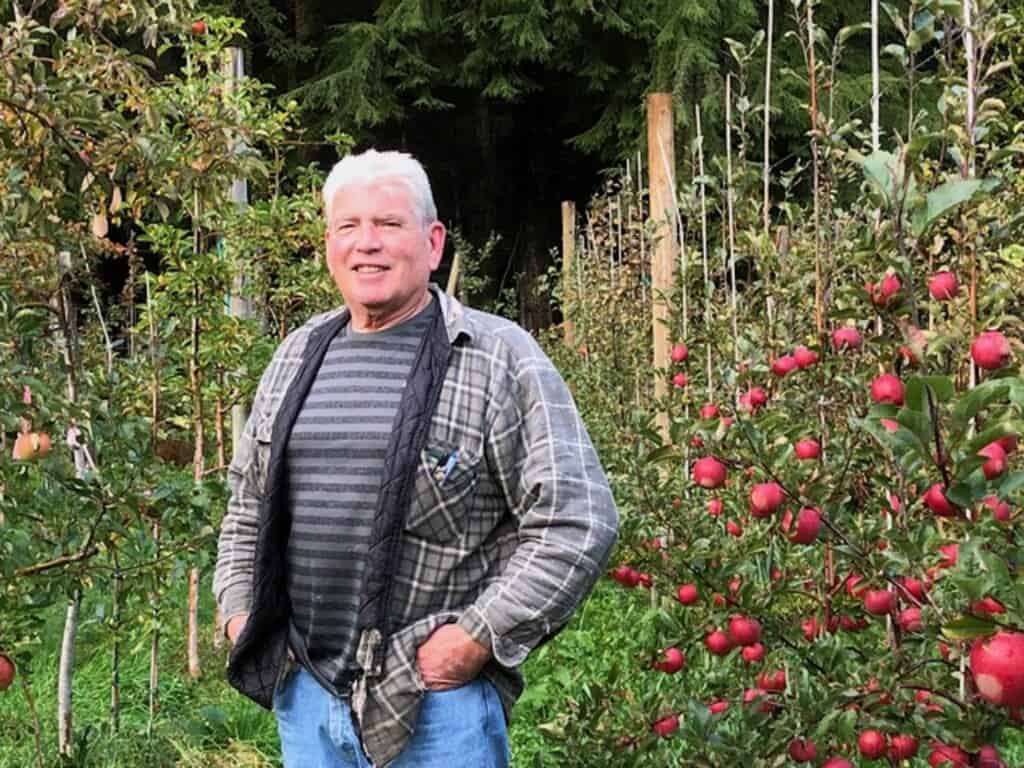
Steve Butler grows more than 600 varieties of apples on his 7 1/2-acre farm. Charlee Glock-Jackson / Gig Harbor Now
The farm is the home of Steve and Donna Butler. They live in a hand-built log home that Steve finished after Donna’s first husband passed away suddenly in the 1970s. They were married in 1980.
Back then, the land was mostly wooded except for the area on which the house stood, Steve recalled.
“I got interested in growing apples in 1985-86 when I bought a few Jonagold and Gravenstein trees from a fellow at the Washington State University extension farm in Puyallup,” he said. “Then I met another guy who taught me how to graft and I bought another 40 trees and just kept adding more and more trees.”
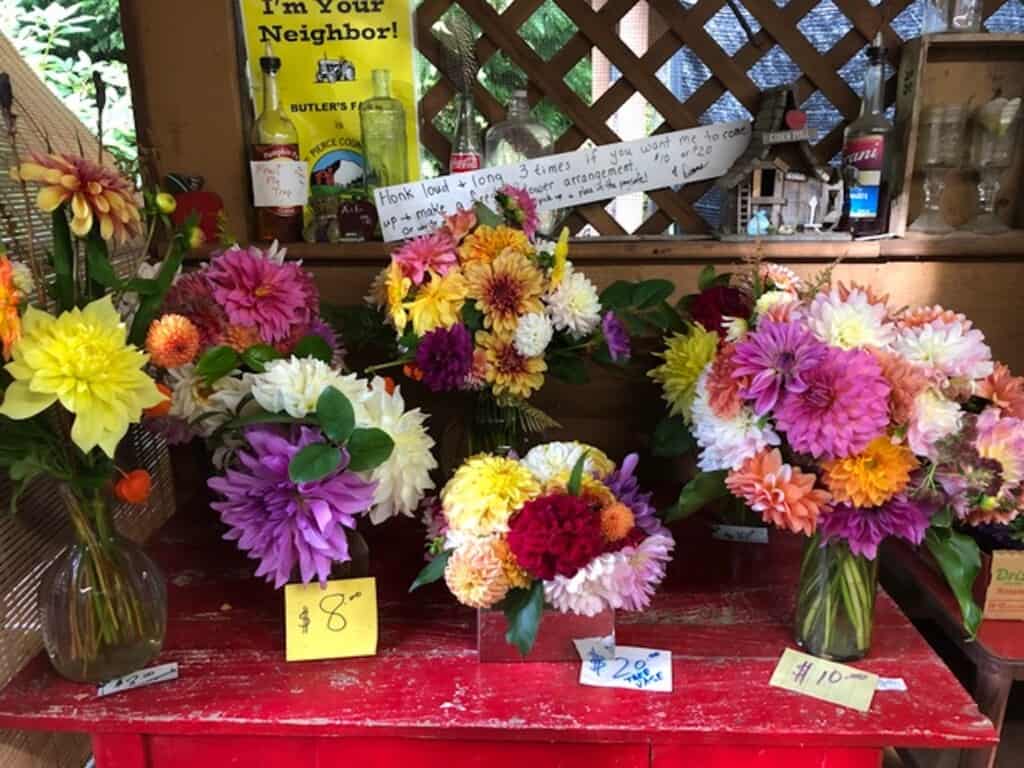
Donna Butler grows rows and rows of dahlias every year that she sells by the bouquet, or by you-cut. She also makes up bouquets for special orders. Charlee Glock-Jackson / Gig Harbor Now
These days, Butler sells his apples — and Donna sells flowers and fresh-from-the-garden produce — from a small shed adjacent to the garage. It is filled with about two dozen boxes of different varieties at any given time. This year, the apples on one side of the shed are going for $2 a pound. Those on the other side are $1.50 a pound or less. There are also bags of “deer treats” for $3 for a 5- or 6-pound bag. All sales are on the honor system.
Each box is labeled with the name of the variety plus a bit about its history, parentage, keeping qualities and what it’s good for. Some are best for eating fresh, some for pies or sauce. Some are excellent keepers and some should never be stored in the refrigerator or they’ll lose their flavor. And some are good for just about everything.
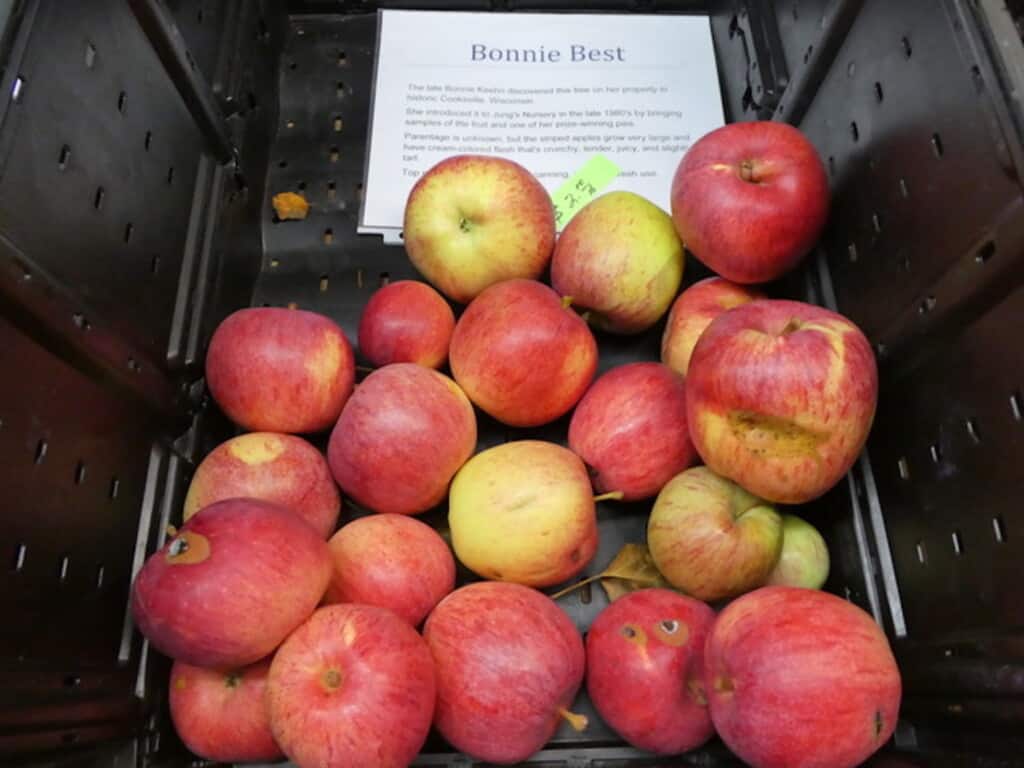
Bonnie Best is one of the best apples for pies, according to Donna Butler. Charlee Glock-Jackson / Gig Harbor Now
Many of the names sound like song lyrics: Sweet 16, Pixie Crunch, Sweet Tango, Fiesta, Rubenette, Blondie, Florina (called Gallerina in Europe), Silken, Ambrosia, Bonnie Best, Pinova, Sansa, Scarlet O’Hara.
Others conjure visions of faraway places or of long-ago legends — King of Tompkins County (discovered in New Jersey in 1750), Holstein, Mailing Kent, Kidd’s Orange-Red, Sekai Ichi (the best seller in Japan) and a variety called Adam’s Pearmain, an heirloom russet type that’s said to have been Thomas Jefferson’s favorite apple.
In addition to old-fashioned varieties like Gravenstein, Melrose, Macoun and Newtown Spitzenburg, Butler also grows several very rare varieties, including Canadian Strawberry and Fall Jennington.
“That one was thought to be extinct until a fellow in Walla Walla found one on his land.” Butler said.
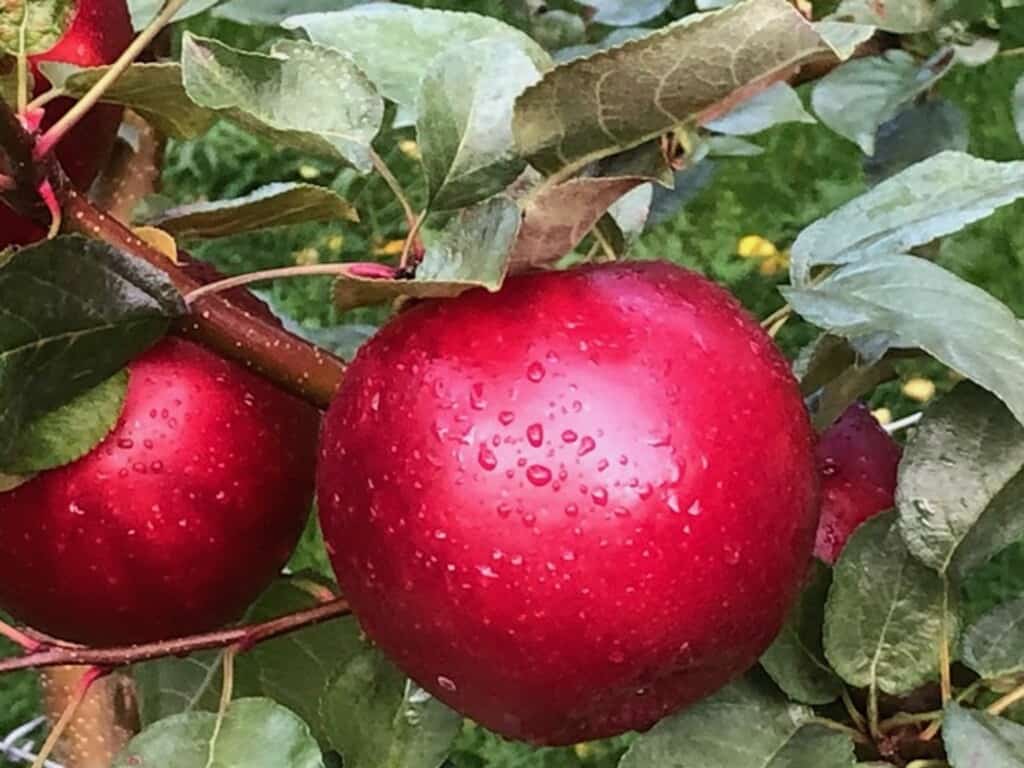
Cosmic Crisp is one of the newest varieties available at Butler’s apple farm. Charlee Glock-Jackson / Gig Harbor Now
The latest additions to the orchard are a row of Cosmic Crisp trees and a brand new variety called Sunrise Magic, both of which were propagated at WSU in Pullman. There’s also a new one from the University of Minnesota that likely will thrive in the Northwest because it’s resistant to apple scab.
“It’s called Triumph, and it’s supposed to be about five times better than Honey Crisp,” Butler said.
Those might be available in his stand in a few years.
“You have to let the roots grow for about three years before you harvest them,” he said. “The first and second year, you pick off all the blossoms so no fruit will set. Then in the third year you might get four or five apples. Then after that, the roots should be strong and mature enough that you can let them produce heavily.”
He only buys young trees that are grafted special 106 root stock, because that’s what grows best in his sandy soil.
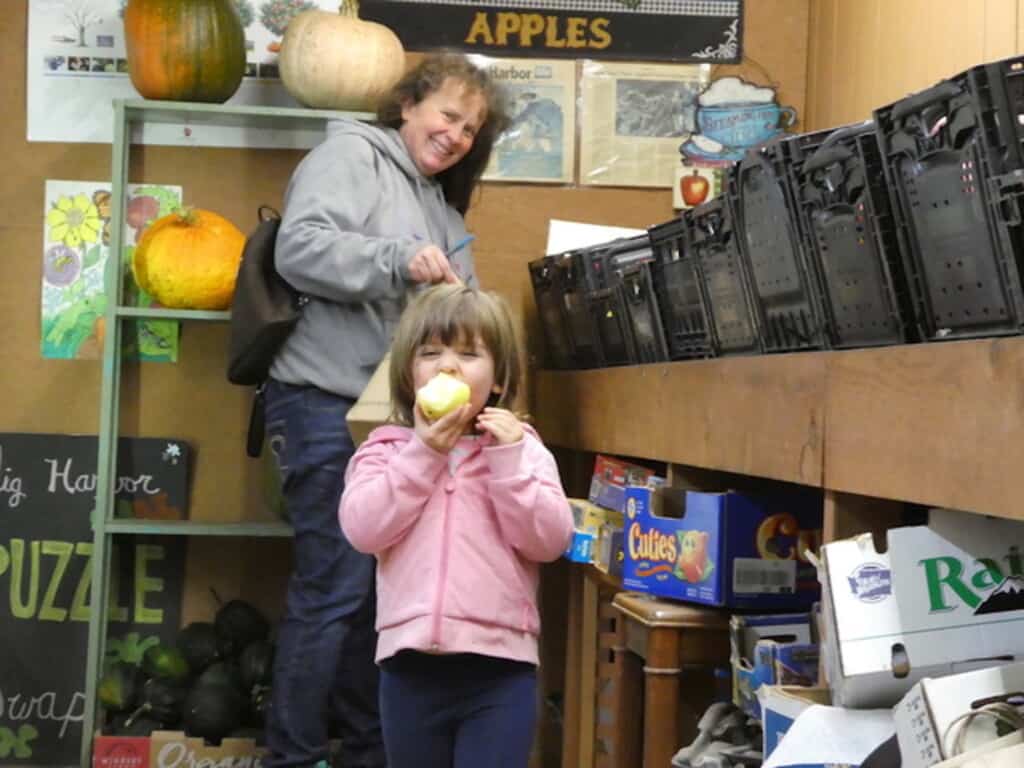
Three-year old Iselin Cabanas samples a “Blondie” apple as her mom, Kirsten Cabanas, fills a bag with this week’s load of apples from Butler’s Apple Farm. They make the trek from Roy every week to buy big bagfuls of Butler’s apples. Charlee Glock-Jackson / Gig Harbor Now
Asking him to name his favorite apple is like asking which kid is his favorite.
“I like the whole range, so my favorite is probably whatever I ate last,” he said with a smile. Zabby, the Butler’s friendly black dog, likes to try whatever Steve is eating, “…but she’s pretty picky about which ones she likes. The squirrels and chipmunks are the same way. Picky.”
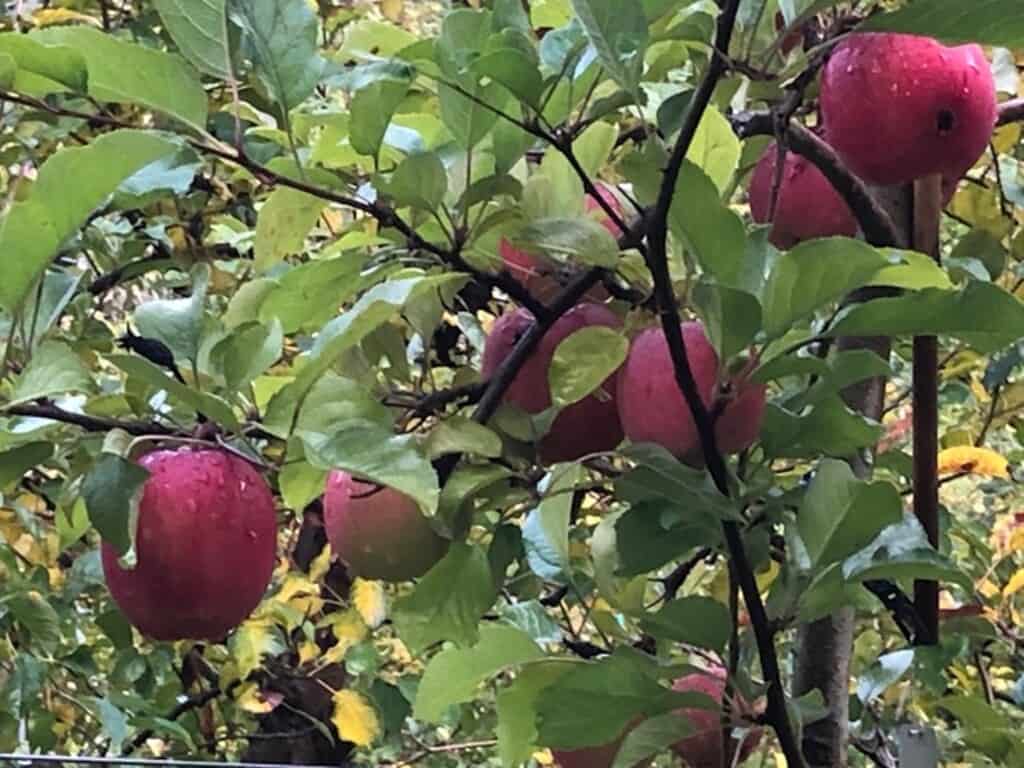
Sunrise Magic is a new variety of apple developed at WSU that’s growing on Butlers’ Farm. It will be ready for sale in the farm stand in a year or two. Charlee Glock-Jackson / Gig Harbor Now
This summer’s 100-plus-degree weather affected different varieties in different ways. It really intensified the flavor of a crabapple called Wickson.
“That one originated in California, so I guess it really liked the heat,” he said. “Others, like Adams Pearmain, are much smaller than usual this year. Still others got sunburned, although that didn’t seem to affect the flavor.”
COVID hasn’t changed the number of people who stop by the stand.
“People still come and buy apples just about every day. They want fresh, healthy, locally grown fruit,” he said.
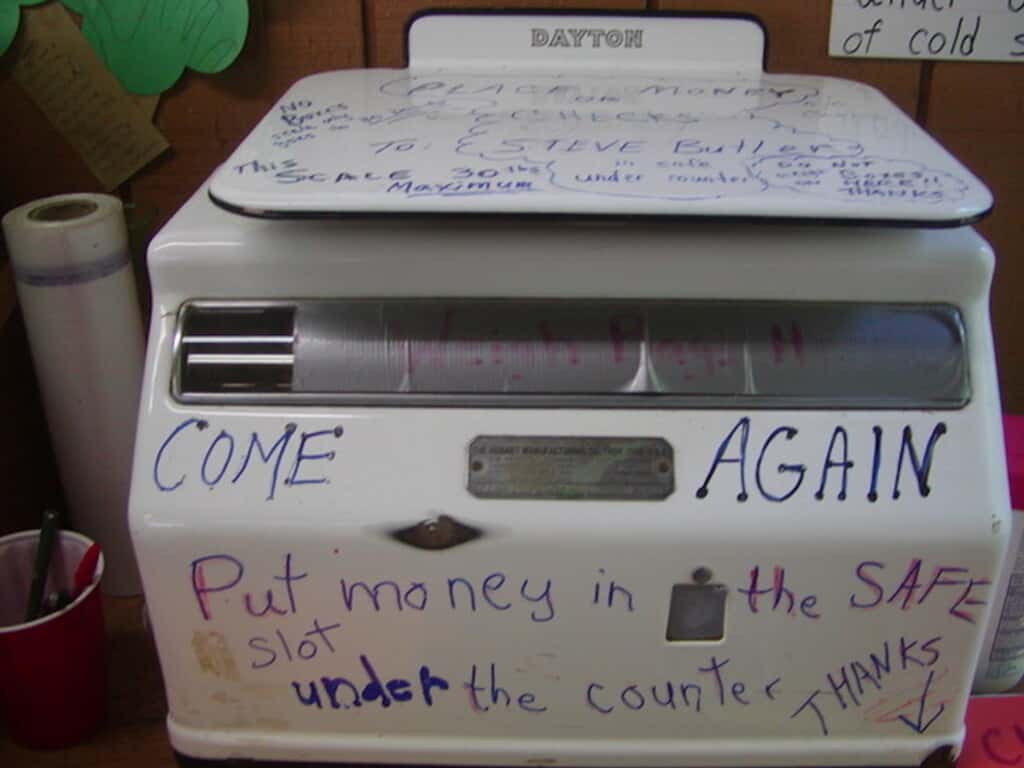
All the fruits, vegetables and flowers at Butlers Apple Farm are sold on the honor system. Charlee Glock-Jackson / Gig Harbor Now
Butler often gives away hundreds of pounds of apples to local food banks and last year the Tacoma Farmers Market turned out to be a huge customer.
“They got a big grant from USDA to buy local crops, and they bought about a thousand pounds of apples a week,” he said. This year the grant was less, but even so they’ve frequently purchased about 100 pounds at a time.
Butler is also involved in the Lost Apple Project that was started several years ago in the Palouse region of Washington by retired FBI and IRS agent Dave Benscoter. Benscoter is on the lookout for apple varieties that are thought to be extinct and his search has taken him from old orchards in the state’s Inland Empire to Idaho, Oregon and even to the Key Peninsula, where he and Butler found an ancient variety called Clarabell growing in Lakebay.
“It was supposedly named after the fellow’s daughter,” Butler said.
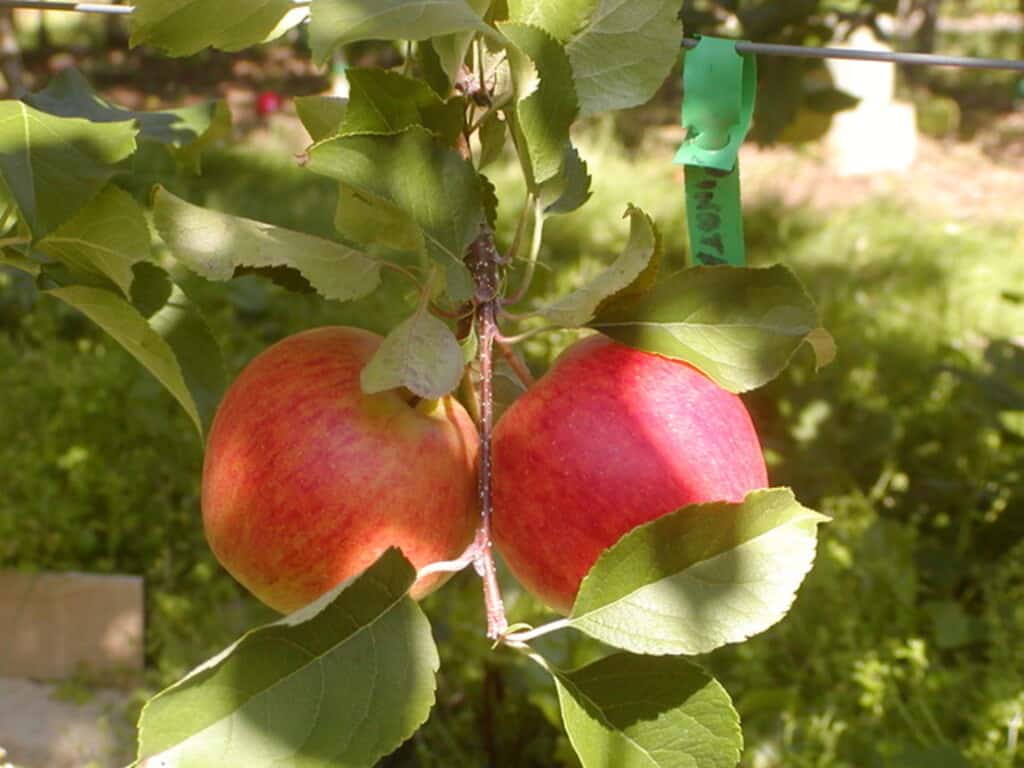
Steve Butler grows more than 600 varieties of apples at his farm in Gig Harbor. Many are heirlooms not likely to be found in a supermarket. Charlee Glock-Jackson / Gig Harbor Now
He’s taken some cuttings and hopes to grow enough Clarabell trees to bring it back to market.
This year, Butler’s stand was open until late February, though the closing date varies from year to year. Fall is the best time to buy apples because the varieties that ripen later have the best flavor and are often good keepers.
Butler will be participating in the Peninsula Fruit Club’s annual fall fruit show this Saturday, at the West Side Improvement Club, 4109 West “E” St., in Bremerton. The show will feature fruit tastings and displays of apples, pears, nuts, grapes and other fruit grown on the west side of Puget Sound, and growers will be on hand to answer questions about how to care for fruit trees. There will also be trees, plants and supplies for sale.
“It’s a great way for people to discover a new favorite apple,” Butler said.
That is, unless you’ve already found your new favorite in Butler’s shed.
Butler’s Apple Farm is located at 137th St. NW and Peacock Hill Avenue. The self-serve stand is open daily from 8 a.m. to 8 p.m.
